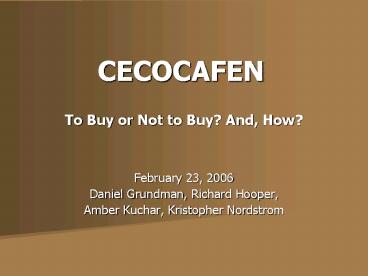CECOCAFEN
Title:
CECOCAFEN
Description:
Volatile market and limited access to credit. Only two years old. Nicaragua. History. 1937 1979: Samoza dictatorship. Sandanistas seize control in armed revolt ... – PowerPoint PPT presentation
Number of Views:40
Avg rating:3.0/5.0
Title: CECOCAFEN
1
CECOCAFEN
- To Buy or Not to Buy? And, How?
- February 23, 2006
- Daniel Grundman, Richard Hooper,
- Amber Kuchar, Kristopher Nordstrom
2
Overview
- Background
- Nicaragua
- Coffee Industry
- Coffee Market
- CECOCAFEN
- Solcafe
- Financing
- Decision
3
Background
- January 1999, a dry coffee processing mill comes
up for sale (Solcafe) - Cecocafen wants to become vertically integrated
- Previously no other coffee cooperative had ever
owned and operated a mill - Volatile market and limited access to credit
- Only two years old
4
Nicaragua
5
History
- 1937 1979 Samoza dictatorship
- Sandanistas seize control in armed revolt
- 9-years of civil conflict
- 1990 begins democratic era
- Aleman elected in 1996
- 1998 Hurricane Mitch
6
Economy
- Poorest country in Central America
- Legacy of civil war
- Inadequate infrastructure
- Corruption and red tape
- Coffee is major contributor to GDP
- Healthy forecast
7
Coffee Industry Overview
- Overview
- World coffee production in 1999/2000 is forecast
at 107.2 million bags - World coffee consumption in 1998/99 is estimated
at 106.0 million bags, up 2 percent from the
preliminary 1997/98 level - Largest Exporters Brazil (23,135,000) Colombia
(9,300,000) Indonesia (5,084,000) - Largest importers Europe, United States, Japan
- Coffee Types
- Arabica
- Robusta
- Coffee Markets
- Movements
- Organic Promotes organic farming and processing
practices - Fair Trade Ensures equitable trading
arrangements for disadvantaged farmers organized
into cooperatives - Specialty Coffee - (Starbucks)
8
Coffee Producing Nations
9
Coffee Pricing
- Long run coffee prices
- Short term periods of high volatility and/or high
prices - Gradual decline in recent history
10
Coffee Industry Processing Supply Chain
- Producers
- Farm workers
- Credit institutions that lend to producers
- Suppliers to producers
- Processors
- Exporters
11
Prevailing Trends in the Coffee Market
- Prices
- Coffee spot prices are a function of world supply
- World pricing sensitive to supply/demand
fluctuations in Brazil - Fair Trade Movement
- Organizations working to ensure fair wages,
cooperative workplaces, consumer education,
environmental sustainability, cultural identity
and public accountability - Specialty Coffee Market
- Organic, shade grown, etc.
- Fastest growing sector of overall market
- World Bank Strategy
- Promoting development in SE Asia through coffee
production
12
Coffee Market in Nicaragua
- Fragmented market
- 80 of farmers have less that 5 manzanas each (1
Manzana .7 hectares) - Land titling
- Disincentive to invest
- Barrier to extension of credit
- Lack of collateral
- Farmer organizations
- Banks
- High transaction costs
- Agricultural sector unable to benefit from formal
banking mechanisms
13
Coffee Market in Nicaragua Key Stakeholders
- Social and Economic impact
- Government/Banks ? Affects other economic sectors
- Wages and unemployment
- Rural economy
- Stakeholders
- Government of Nicaragua
- Farmers
- Labor
- Global Trading Partners
- NGOs
- Development Agencies
14
CECOCAFEN
- Established 1997 to export Nicaraguan coffee to
Europes specialty markets. - Represents 1200 producers
- Promotes sustainable development and social
programs - Cuts out traditional middleman and increases the
money going back to the producer - Focus on increasing quality of coffee
15
CECOCAFEN
16
CECOCAFEN
Sales and Production
17
Cecocafen/Nicaragua Options
- Leverage comparative advantage of coffee industry
and focus on enhancing coffee quality and
reducing costs in order to ensure sustainability - Pursue a diversification strategy into other long
term products in order to minimize risk to the
economy
18
SOLCAFE
- Solcafe is a wet processing mill
- Coffee is prepared and shipped
- Would act as an information center accessing
quality and sales availability - Has excess capacity and can easily expand
- Critical to achieving the vision of Cecocafen
19
Financing
- Options
- National Most of the larger banks have some
coffee lending in their portfolio - Export Sector They finance about 88 of the
short-term debt for coffee producers in Nicaragua - International Banks Rabobank, Oikocredit and
Triodos are anthroposophical banks with strong
social missions - Micro-Credit/NGO/Other Primarily finance
ancillary projects
20
Financing
- Oikocredit
- Operates like a development "bank", providing
financing to disadvantaged people, people who
would normally not get a loan from a commercial
bank. - Loan duration 2-10 years
- Flexible interest rates based on market rate,
country and project risks, development relevance - Dividend Modest, usually 2
21
Decision
22
RESULTS
- May 1999, Cecocafen bought Solcafe with a loan
from Oikocredit - Coffee prices crash in December 2001 at 41.5
cents per pound - Coffee prices at record lows
- Global over-production leads to accumulation of
inventories - Increasing competition on global scale
- Due to Fair Trade and flexible interest rates
Ceocafen and Solcafe survived the crash































